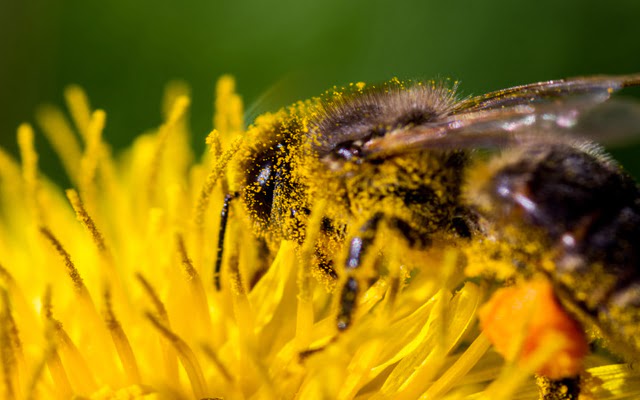
During springtime in Wonderopolis, there is a vibrant energy in the air. Pollen fills the atmosphere, flowers are blossoming, and one of the most industrious insects on the planet is hard at work. Can you guess which insect we are referring to? It’s the bees!
When it comes to bees, you may ponder about the reason behind their buzzing sound. The answer lies in their significant role within the Earth’s vast ecosystem. In fact, experts estimate that bees are responsible for one-third of the food consumed by humans. They are incredible pollinators and contribute greatly to our world.
Have you ever wondered why bees buzz? The buzzing sound is created by the rapid beating of their wings as they fly through the air. These wing movements generate vibrations that our ears perceive as buzzing. The larger the bee, the slower its wings beat, resulting in a lower-pitched buzzing sound.
However, buzzing is not merely a display—it serves a crucial purpose. When certain species of bees, such as bumblebees, visit flowers, the buzzing and vibrations of their wings and bodies cause the pollen to shake off the flower. The pollen then clings to the bee’s body and gets transferred to the next flower it visits. This process is known as “pollination.”
Bees also buzz when they defend themselves or their hives. If you have ever come too close to a bee in its natural habitat, you are aware of this! The familiar buzzing serves as a warning to check your surroundings and move away from any bees you encounter. Otherwise, you may disrupt their pollination efforts and receive a painful sting.
Next time you enjoy fresh fruits or vegetables, take a moment to thank the bees! These small insects play a vital role in sustaining life on Earth. Without them, the spring and summer seasons would be much less colorful.
Try It Out
Are you curious for more information? Engage in one or more of the activities below with a friend or family member.
- Do you frequently see bees in your area? Now that you understand their crucial role, you might be interested in creating a more pollinator-friendly yard. Choose one or two tips from the provided guide and seek assistance from an adult friend or family member. Have fun transforming your yard into a welcoming environment for pollinators!
- Bees live in fascinating societies. Take a peek inside a beehive by watching the PBS video. Afterward, summarize the most important five facts you learned from the video and share them with a friend or family member.
- What else would you like to know about bees? Create a list of questions and ask an adult friend or family member to help you conduct research online or at your local library. Don’t forget to jot down the intriguing facts you discover!
Wonder Sources
- https://www.scientificamerican.com/article/why-do-bees-buzz/ (accessed 03 June 2021)
- https://www.irishexaminer.com/lifestyle/healthandwellbeing/arid-40047884.html (accessed 03 June 2021)
FAQ
1. Why do bees buzz?
Bees buzz as a result of their flight muscles vibrating at a high frequency. This buzzing sound is created by the rapid movement of their wings, which can beat up to 200 times per second. The buzzing serves multiple purposes for bees, including communication with other bees, attracting mates, and warning off potential predators.
2. How do bees produce the buzzing sound?
Bees produce the buzzing sound by contracting and relaxing their flight muscles at a rapid rate. This causes their wings to vibrate, generating the buzzing noise. The frequency of the buzzing can vary depending on the bee species and the purpose of the buzzing, such as foraging or defense.
3. Can bees control the intensity of their buzzing?
Yes, bees can control the intensity of their buzzing. By adjusting the speed and force of their wing beats, they can produce different levels of buzzing sound. For example, when a bee wants to communicate with other bees in its colony, it may produce a softer buzzing sound. On the other hand, if a bee feels threatened, it may increase the intensity of its buzzing to warn off potential predators.
4. Do all bees buzz?
While the majority of bees do buzz, not all bees produce a buzzing sound. Some species, such as bumblebees, produce a lower-pitched humming sound instead of a distinct buzz. Additionally, male bees, also known as drones, do not have the necessary flight muscles to produce a buzzing sound.
5. Is the buzzing sound of bees important for their survival?
Yes, the buzzing sound of bees is important for their survival. Bees use their buzzing as a form of communication, enabling them to communicate important information to other bees in their colony, such as the location of food sources or potential threats. The buzzing also helps bees attract mates during the mating season. Without the buzzing sound, bees would face difficulties in communication and reproduction, which are vital for their survival as a species.
6. Can humans hear the buzzing sound of bees?
Yes, humans can hear the buzzing sound of bees. However, the buzzing sound of bees is often at a higher frequency than what humans can hear, especially when bees are in flight. Humans are more likely to hear the buzzing when bees are close by or in large numbers. Some people may find the sound of bees buzzing comforting, while others may feel anxious or afraid due to a fear of bees or allergies.





Leave a Reply